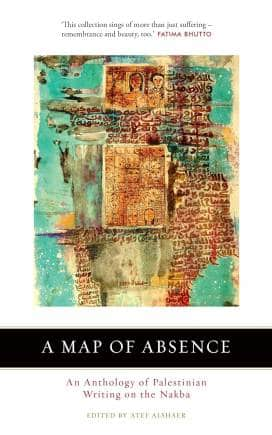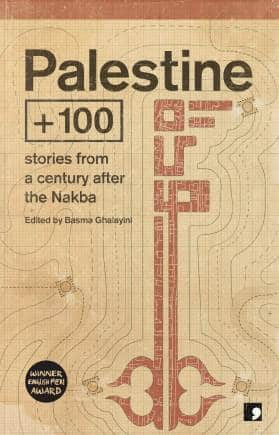



The word “nakba”, meaning “catastrophe” in Arabic, has a profound significance for Palestinians. They use it to describe the mass displacement of their people during the 1948 Arab-Israeli war, which led to occupation and oppression, as well as unending strife.
 Saqi Books, 320 pages.
Saqi Books, 320 pages.
In the decades since, Palestinian literature has been a source of both documentation and inspiration. Much of it is in the form of powerful poetry influenced by Arab literary traditions as well as reactions to modernization and colonization. Short stories and novels, too, form a part of this creative inheritance.
A good starting point to explore the wealth of contemporary Palestinian literature is A Map of Absence, a 2019 anthology of Palestinian writing on the Nakba edited by Atef Alshaer. The book is a collection of poems, stories, and excerpts by established and new writers. Among their number are the influential Edward Said; the Arabic Booker Prize winner Ibrahim Nasrallah; the memorably satirical Emile Habibi; the Lebanese novelist Elias Khoury; and, of course, the treasured poet Mahmoud Darwish.
Such work, Alshaer writes, “is rich in experimentation and expressionism”. It is no longer primarily a literature of resistance and militant language, he goes on, even though this continues to emerge in a younger generation’s writing.
Striking examples of the work of this new set can be found in another anthology from 2019 titled Palestine +100, edited by Basma Ghalayini. It comprises stories from 12 writers who were asked: what might your country look like in the year 2048, a century after the tragedies and trauma of the Nakba? As such, the collection is made up of speculative styles that range from SF noir to nightmarish dystopia to high-tech farce.
This may seem paradoxical, given that Ghalayini writes in the introduction that the engine of Palestinian writing is a search for a lost inheritance as well as an attempt to keep the memory of that loss from fading. That is why the genre of science fiction has never been particularly popular among Palestinian authors: “It is a luxury, to which Palestinians haven’t felt they can afford to escape”.
However, she continues, another defining feature of contemporary Palestinian fiction is the cultural disconnect between different sets of refugees and generations. Science fiction, with “its love of alternate realities offers surprising opportunities for exploring this”. More importantly, “the mere idea of ‘things to come’ is licence to re-imagine, re-configure, and re-interrogate the present”.
 Comma Press; 197 pages.
Comma Press; 197 pages.
The stories in Palestine +100 go a long way in burnishing that hypothesis. In these pages, pain and loss is mitigated through conjecture, and hopelessness is alleviated through irony.
One of the most poignant tales is Abdalmuti Maqboul’s ‘Personal Hero’, translated by Andrew Leber, which breathes new life into the old trope of time travelling in reverse: “Tank wheels, windmills, telephone dials, the springs coiled behind clock faces all run counter.” Here, a Palestinian leader killed in 1948 returns from his grave to reconnect with his daughter and spend days that are “full of sacrifice and protests and love of his people”.
Unsurprisingly, there are more than a few variations on the theme of virtual reality. In Saleem Haddad’s ‘Song of the Birds’, a young girl in a picture-perfect Gaza mourning the loss of her brother suspects that her surroundings are merely a simulation masking a sombre reality. In Majd Kayyal’s ‘N’, translated by Thoraya El-Rayyes, people are addicted to virtual-reality role-playing, with memories of the past erased. And in Emad El-Din Aysha’s ‘Digital Nation’, a vision of a united Palestinian state is “virus-leaked into every VR console on the Israeli market”.
Others are more futuristic, not to mention audacious. In Talal Abu Shawish’s ‘Final Warning’, translated by Mohamed Ghalaieny, a “many-limbed, many-mouthed” spaceship appears in the skies above Ramallah with a warning for humans to stop threatening the planet’s stability. In Mazen Maarouf’s ‘The Curse of the Mud Ball Kid’, translated by Jonathan Wright, a boy sets out to recreate himself as the first Palestinian superhero, praying “to become Robomicrobe” so he can recover the lost imagination of children.
Then, there’s Selma Dabbagh’s ‘Sleep it Off, Dr Schott’, which is in the form of a digitally recorded letter about a bond between a Gaza-born professor and a Tel Aviv-born co-worker in a Secular Scientific Enclave, which endangers the security of an Economic Hyperloop. And Ahmed Masoud's ‘Application 39’ features a Palestine of independent republics, when each major city has declared itself an independent state. In this scenario, Gaza makes an intrepid bid to host the next Olympic Games.
Yet others blend elements of crime fiction, such as Samir El-Youssef’s ‘The Association’, translated by Ralph Cormack. Here, a journalist investigating a murder wonders who would want to kill a historian in a country where the study of the past is forbidden. After all, they were “all out of work, obsolete, unable to publish, and no longer enjoyed any degree of public recognition”. That sounds prescient, and not just for Palestine.
As Ghalayini points out, “absence is everywhere” in these stories. This connects them with other streams of Palestinian writing obsessed with the past, as “it is the only thing that makes their current existence and their identity meaningful”. At a time of savage reprisals and disinformation, recorded histories, hopes and memories are more valuable than ever.
Discover the latest Business News, Sensex, and Nifty updates. Obtain Personal Finance insights, tax queries, and expert opinions on Moneycontrol or download the Moneycontrol App to stay updated!
Find the best of Al News in one place, specially curated for you every weekend.
Stay on top of the latest tech trends and biggest startup news.